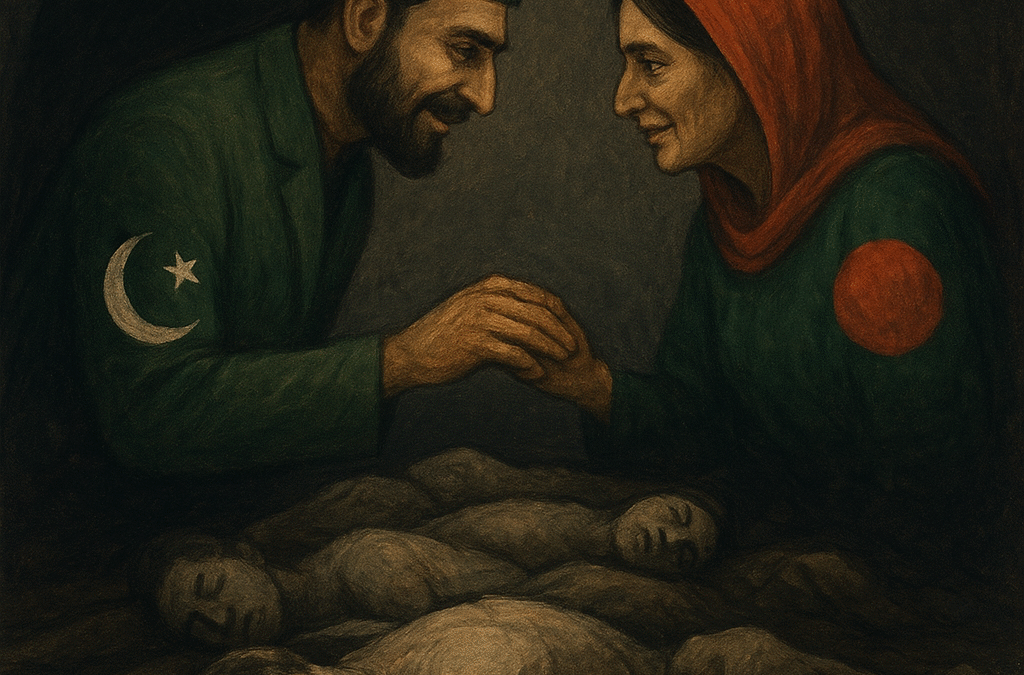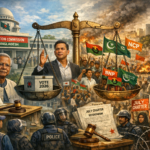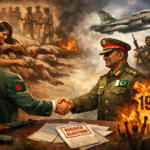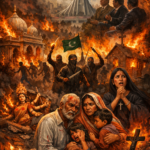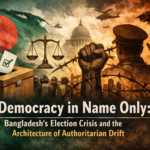Introduction
Bangladesh, born from the ashes of one of the twentieth century’s most brutal genocides, now finds itself at a dangerous political crossroads. The ideals for which three million martyrs died in 1971—secularism, democracy, equality, and cultural pride—are once again under siege. Not by Pakistani tanks and soldiers this time, but by a toxic alliance of Jamaat-e-Islami, Islamist student factions, and the Bangladesh Nationalist Party (BNP), who seek to reverse history and turn Bangladesh into a vassal state of Pakistan and a Taliban-style Islamist playfield.
This alliance, backed by covert foreign interests, thrives on disinformation, chaos, and radicalisation. It is aided by opportunistic student coordinators who have transformed campuses into breeding grounds of extremism, echoing the violent tactics of their ideological mentors—the Taliban and Pakistan’s Inter-Services Intelligence (ISI).
At stake is not just the political fate of Sheikh Hasina and the Awami League but the very soul of Bangladesh as an independent, sovereign, and secular state.
The Decisive Stage in Bangladeshi Politics
The current political scenario is precarious. Dr Muhammad Yunus, the interim head of the caretaker setup, is reportedly preparing to step down. Rumours suggest preparations are underway for a military-backed caretaker government that could last six months to a year. This proposed arrangement resembles the infamous 2007–08 army-backed caretaker regime, which destabilised the democratic fabric of the country under the guise of reform.
Yet there is a crucial difference this time: the geopolitical environment is more combustible. Bangladesh is caught in the tug-of-war between India’s strategic oversight, Pakistan’s covert manipulations, and the creeping influence of Islamist networks emboldened by regional jihadist victories.
Reliable sources indicate that Sabre Hossain Chowdhury, a seasoned Awami League leader, was approached to reorganise the party without Sheikh Hasina at the helm. His refusal underscores a hard truth: the Awami League cannot be surgically separated from its leader. Any attempt to decapitate the party leadership risks plunging Bangladesh into more profound instability, which is precisely what the Islamist-Jamaat-BNP nexus desires.
The Jamat-BNP-Islamist Conspiracy
Jamaat-e-Islami: The Ghost of 1971
Jamaat-e-Islami, the political force that collaborated with the Pakistan Army during the Liberation War, remains the most dangerous internal threat to Bangladesh’s sovereignty. Despite being formally banned, Jamaat’s influence lingers through front organisations, financial institutions, NGOs, and madrasa networks. Their agenda is simple: erase the memory of 1971, rehabilitate war criminals, and drag Bangladesh back into Pakistan’s orbit.
The blood-soaked legacy of Jamaat is well documented. From the Al-Badr and Al-Shams death squads to their systematic campaign of mass rape and murder, Jamaat leaders were complicit in genocide.1 Today, their descendants in politics and student organisations, particularly Islami Chhatra Shibir, continue the same ideology of violence, intimidation, and communal polarisation.
BNP’s Opportunistic Alliance
The BNP, under Khaleda Zia and now her heirs, has consistently used Jamaat as a political ally. This opportunistic marriage of convenience undermined Bangladesh’s democratic fabric for decades. BNP’s leadership remains fragmented, visionless, and hostage to a politics of revenge rather than responsibility. Their tacit acceptance of Jamaat’s ideology betrays the sacrifices of millions who fought for freedom.
BNP’s legacy includes allowing Jamaat’s war criminals to occupy ministerial posts, paving the way for Pakistan’s influence to seep back into Dhaka’s corridors of power. Their failure to distance themselves from Islamist militancy makes them complicit in this ongoing national betrayal.
Student Coordinators: From Quotas to Talibanism
Recent student uprisings, initially sparked by grievances over education costs and quotas, have been hijacked by Islamist ideologues. What began as a movement for educational justice has morphed into a pseudo-revolutionary frenzy with alarming Taliban undertones. The so-called “student coordinators” are less concerned with structural reforms than with imposing an Islamist order that rejects Bangladesh’s Liberation War ethos.
This manipulation mirrors Pakistan’s history, where student groups like Islami Jamiat-e-Talaba became militant pipelines feeding the Taliban and Al-Qaeda. Bangladesh’s campuses, once nurseries of secular nationalism, are now at risk of being converted into radical breeding grounds.2
India’s Strategic Interests and the Regional Equation
Bangladesh’s security and survival are inextricably tied to India’s strategic outlook. The Indian Armed Forces remain closely aligned with Bangladesh’s military establishment. India views Bangladesh not only as a neighbour but as a critical buffer against Pakistan’s destabilisation and China’s encroachment in the Bay of Bengal.
Any military-backed caretaker arrangement without Sheikh Hasina’s consent risks weakening this alignment. India remembers 1971, when its support—military, political, and humanitarian—was decisive for Bangladesh’s birth. For India, a Bangladesh falling into Islamist hands would be a strategic nightmare, emboldening cross-border terrorism in West Bengal and Assam.
The Awami League and Sheikh Hasina’s Indispensability
Despite criticisms, Sheikh Hasina remains the linchpin of Bangladesh’s stability. Her leadership embodies the continuation of 1971’s legacy; her policies have systematically marginalised Jamaat, and her government brought war criminals to trial. To attempt to reorganise the Awami League without her is not only politically suicidal but also morally bankrupt.
Her likely contestation in the next inclusive election would reaffirm the Awami League’s mandate. It is only through her participation that political continuity, stability, and India’s strategic support can be assured.
The Islamist Dream of a Talibanized Bangladesh
The ultimate goal of Jamaat, BNP hardliners, and Islamist student factions is clear: to dismantle secularism and transform Bangladesh into a Taliban-styled Islamist playfield. This would involve:
-
Rewriting history: Denying the genocide of 1971, erasing the Liberation War’s secular character, and portraying Pakistan as a “brotherly ally.”
-
Legal imposition of Sharia: Using madrasa networks and Islamist-dominated courts to roll back women’s rights, freedom of expression, and minority protections.
-
Foreign alignment: Re-establishing Bangladesh as a client state of Pakistan, while courting Taliban-style legitimacy from transnational jihadist groups.
-
Campus radicalisation: Turning universities into hotbeds of Islamist mobilisation, silencing secular and progressive voices.
This project is nothing short of treason against the martyrs of 1971. It represents a direct assault on Bangladesh’s sovereignty, cultural identity, and future.
The Military Factor: Guardian or Usurper?
The Bangladesh Armed Forces have historically played an ambivalent role. From the coups and countercoups of 1975 to the 2007–08 caretaker regime, their interventions have often destabilised democracy. Yet today, the military appears more aligned with India’s strategic perspective, aware that an Islamist takeover would destabilise the region.
The question remains whether the armed forces will act as guardians of secular nationalism or become pawns in another Jamaat-BNP ploy for power. The stakes are too high for ambiguity.
A Warning from History
Bangladesh’s current crisis echoes the betrayals of 1975, when the assassination of Sheikh Mujibur Rahman opened the floodgates for military juntas, Islamist rehabilitation, and Pakistani influence. Those years of betrayal nearly erased the dream of 1971.
History cannot be allowed to repeat itself. The Islamist agenda is not a political alternative—it is national suicide.
Conclusion: The Choice Before Bangladesh
Bangladesh today stands at a critical juncture. On one side lies the legacy of 1971, secularism, cultural pride, and democratic aspirations. On the other side lurks the toxic vision of Jamaat, BNP, and Islamist radicals who dream of reducing Bangladesh to a client state of Pakistan and a Talibanized wasteland.
The people of Bangladesh must choose. They must remember the rivers of blood that flowed in 1971, the mothers who lost sons, the mass graves, and the dream of an independent nation. To betray this legacy by embracing Jamaat-BNP-Islamist conspiracies is to spit on the graves of the martyrs.
Sheikh Hasina’s leadership remains indispensable to maintaining this course. Her presence ensures political continuity, India’s strategic partnership, and the preservation of Bangladesh’s secular ethos. To remove her or to empower the Islamist nexus is to betray history itself.
Bangladesh must rise again—against Jamaat, against BNP opportunism, against student radicals, and against Pakistan’s insidious influence. The future of the nation depends on this resistance.
Footnotes
Bibliography
-
Jahan, Rounaq. Pakistan: Failure in National Integration. Columbia University Press, 1972.
-
Riaz, Ali. Islamist Militancy in Bangladesh: A Complex Web. Routledge, 2008.
-
Baxter, Craig. Bangladesh: From a Nation to a State. Westview Press, 1997.
-
Mascarenhas, Anthony. The Rape of Bangladesh. Vikas Publications, 1971.
-
D’Costa, Bina. Nationbuilding, Gender and War Crimes in South Asia. Routledge, 2011.
-
Bass, Gary J. The Blood Telegram: Nixon, Kissinger, and a Forgotten Genocide. Alfred A. Knopf, 2013.

